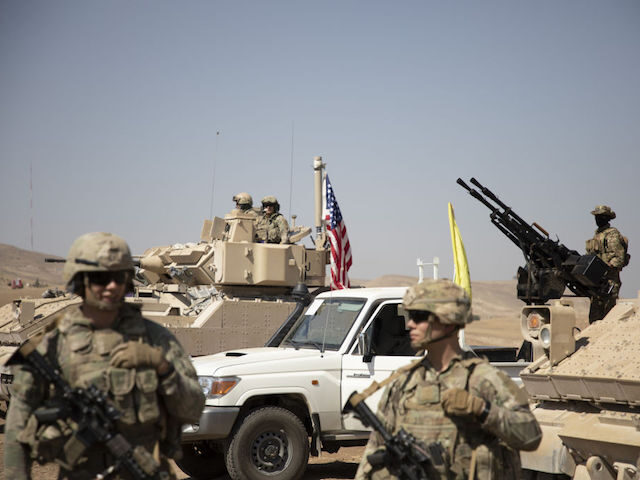The Pentagon said on Thursday that six U.S. troops in Syria suffered traumatic brain injuries after an attack on their positions last week by Iran-backed militias.
Six other injured soldiers were reported at the time, along with one American contractor killed and one injured.
“All personnel in the vicinity of a blast are screened for traumatic brain injury. So these additional injuries were identified during post-attack medical screenings,” Pentagon spokesman Brig. Gen. Patrick Ryder said at a press briefing on Thursday. He noted additional injuries could be uncovered during further screenings.
Ryder said four of the brain injuries were sustained during the March 23 drone attack on Hasaka, Syria, which also caused the fatality and injury to U.S. contractors. The other two were from an indiscriminate rocket attack on a site in northeastern Syria called Green Village on the morning of the following day.
The U.S. launched precision airstrikes against militia targets in Syria affiliated with Iran’s Islamic Revolutionary Guard Corps (IRGC) in retaliation for the drone attack. The Pentagon estimated eight militia fighters were killed by the strikes, while some outside observers said there were up to 19 casualties, including several soldiers from the Syrian army.
Syrian militia groups responded to the U.S. airstrikes by launching their own retaliatory rocket and drone attacks, injuring one American in the process. The New York Times (NYT) on Friday quoted a senior U.S. official who said the White House decided to “hold off” on further retaliatory actions.
The NYT noted the Pentagon has not yet responded to reports that the air defense system at the Hasaka base was “not fully functional and did not stop the drone despite the forces being on high alert following 78 Iran-backed attacks in the region over the past two years.”
“We do not seek conflict with Iran, but we will always protect our people,” Ryder said at his Thursday press briefing.
“We will continue to take appropriate action at a time and place of our choosing to ensure that our forces are protected,” Ryder said when asked by Voice of America News (VOA) why the U.S. has taken no further action.
VOA quoted Sen. Tom Cotton (R-AR) questioning the effectiveness of the Biden administration’s response to Iranian proxy attacks on United States forces during a Tuesday hearing with Secretary of Defense Lloyd Austin.
“What kind of signal do we think this sends to Iran when they can attack us 83 times since Joe Biden has become president, and we only respond to four?” Sen. Cotton asked Austin.
“Maybe it’s because they know that … we will not retaliate until they kill an American, which emboldened them to keep launching these attacks which kill Americans,” Cotton ventured.

COMMENTS
Please let us know if you're having issues with commenting.